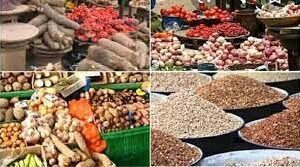Oxfam Nigeria has raised concern over the possible food crisis across the sub-continent, calling for West African leaders to do more to facilitate non-violent, non-conflict dispute resolution.
This was contained in a statement by The NGO stating that as many as 828 million people were hungry in 2021, an increase of 150 million since the outbreak of the COVID-19 pandemic.
While reacting to the development, Oxfam International’s Country Director in Nigeria, Dr Vincent Ahonsi said that “It is deeply concerning that global hunger has been spiralling since 2019, and is now at such devastating levels around the world”.
According to him, “This is happening not just because of a shortage of food alone, but rather as a consequence of broken food systems, supply chain disruptions occasioned by conflicts and effects of the COVID-19 pandemic, and worsening climate change”.
“In Nigeria, pockets of droughts and conflicts are either making farming difficult, or forcing arable lands to be abandoned with food prices drastically going up, preventing the poorest from access to food”.
“Many people are being forced to skip meals, sell livestock or land, take out loans, and withdraw their children from school, with the girls most often the first.”
“With more than 27 million people currently suffering from hunger in the West African region and another 11 million facing the possibility of going hungry, there cannot be a more perfect hunger storm,”.
“To save lives, rich donor governments must honour their promised funding pledges. To date, less than 20% of the $3.8bn UN appeal for the Central Sahel and the Lake Chad Basin has been funded. Governments must stop making empty promises or creating more bureaucratic processes”, he stressed.
“Instead, they need to invest in small-scale food producers and food workers. They need to repurpose our global agriculture and food system to better serve the health of people, our planet, and our economies,” said Dr Ahonsi.
The Oxfam Country Director further said that “We must put our money where our mouth is. Western governments should free up resources through progressive tax including taxing billionaires – in order to invest in diverse, local sustainable food production that helps countries to become less dependent on food imports; and support smallholder food producers, especially women.”
for her part, the communications officer of Oxfam Nigeria, Rita Abiodun stated that to date, only 17% of the total UN appeal for Central Sahel (Niger, Mali, Burkina Faso) and the Lake Chad Basin (Niger, Nigeria, Chad, Cameroon) has been funded.
Also, to date, only $979 million of the total $6.96 billion UN appeal for Somalia, Kenya, Ethiopia and South Sudan (both HRP and FA) has been funded. This is a gap of 86%.




